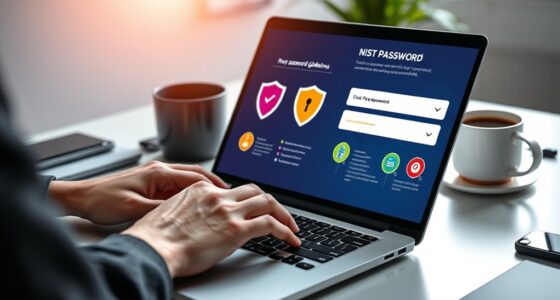To browse securely, guarantee your software and security tools stay up to date with automatic updates. Use strong, unique passwords and enable two-factor authentication for extra protection. Be cautious on public Wi-Fi—prefer a VPN and avoid sensitive activities there. Only visit secure websites with HTTPS for transactions, and always clear your browser data regularly. If you want expert tips to maximize your safety online, keep exploring—you’re just a step away from smarter browsing.
Key Takeaways
- Always verify websites use HTTPS and have valid SSL certificates before entering sensitive information.
- Enable your browser’s privacy settings and regularly clear cache, cookies, and stored passwords for added security.
- Use a VPN on public Wi-Fi to encrypt your data and protect against unauthorized access.
- Recognize and avoid phishing links and suspicious attachments by hovering over links and scrutinizing email sources.
- Keep your browser, plugins, and security software up to date to patch vulnerabilities and stay protected.
Keep Your Software Up to Date

Keeping your software up to date is essential for secure browsing. Regularly performing a software update guarantees you get the latest security features and bug fixes. These updates often include vulnerability patches that close loopholes cybercriminals may exploit. When you ignore updates, your system becomes more susceptible to malware, phishing attacks, and data breaches. Make it a habit to enable automatic updates whenever possible, so your software stays current without manual effort. Staying up to date with your browser, operating system, and plugins helps protect your personal information and keeps your online activities safe. Updating software regularly helps ensure you are protected against the newest threats. Don’t delay installing updates—doing so reduces your risk exposure and keeps your browsing experience secure. Remember, updates are your first line of defense against online threats.
Use Strong and Unique Passwords
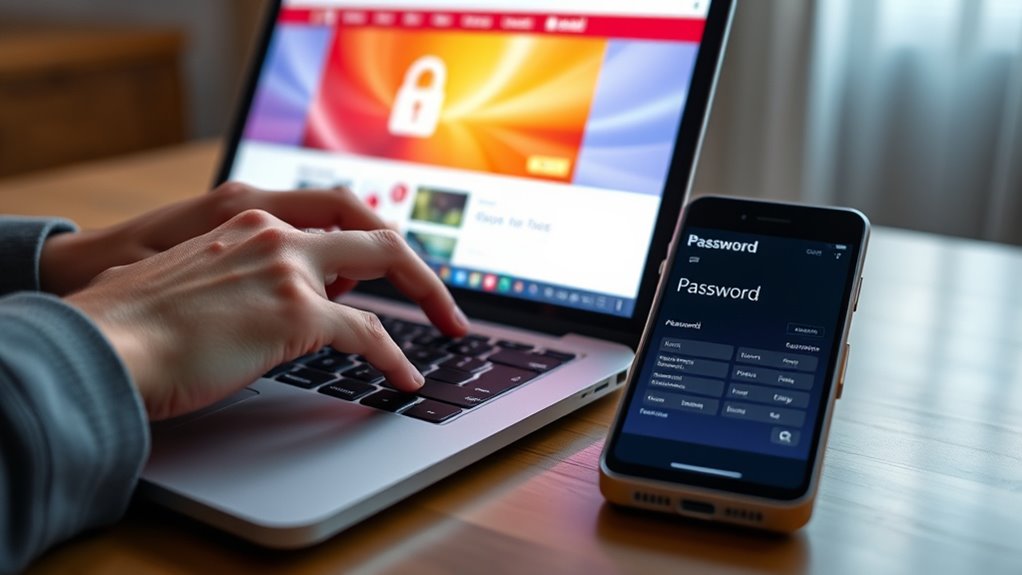
Using strong and unique passwords is one of the most effective ways to protect your online accounts from unauthorized access. To improve your password management, focus on creating passwords with high complexity—mix uppercase, lowercase, numbers, and symbols. Avoid reusing passwords across sites, as this weakens your security. Use a password manager to generate and store unique passwords easily. Remember, longer passwords are typically more secure. Here’s a quick comparison:
| Password Type | Example |
|---|---|
| Weak | password123 |
| Moderate | Summer2024! |
| Strong | G#9t!Lp7&zQ2x*W3 |
| Unique | MyUn1queP@ssw0rd!2024 |
| Reused | SamePassword123 |
Prioritize password complexity and management to stay safe online.
Enable Two-Factor Authentication
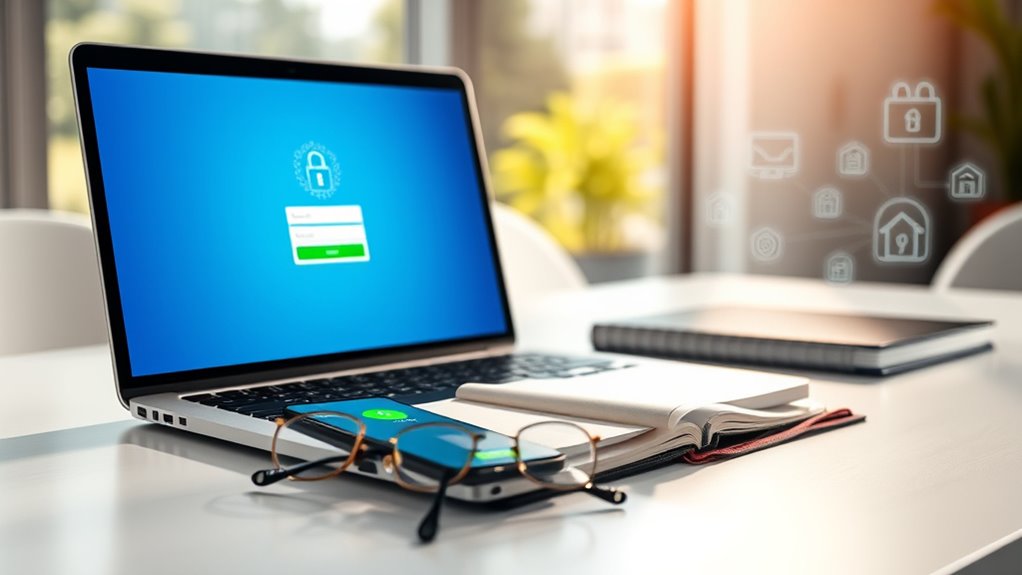
Enabling two-factor authentication adds an extra layer of security to protect your account access. Using authentication apps makes it easier and safer to verify your identity without relying solely on text messages. This step helps keep your personal information secure from unauthorized access. Additionally, understanding advanced techniques for online security can further enhance your protection.
Protect Account Access
Activating two-factor authentication adds an essential layer of security to your account, making it considerably harder for unauthorized users to gain access. By enabling this feature, you ensure that even if someone guesses your password, they still need a second verification step. To keep your accounts secure, practice good password management by using unique, strong passwords and updating them regularly. Regular account monitoring helps you spot suspicious activity early, so you can react quickly if your account is compromised. Two-factor authentication reduces the risk of hacking and unauthorized access, giving you peace of mind while browsing. Remember, no security measure is foolproof, but combining these practices substantially boosts your defenses against cyber threats. Additionally, understanding your privacy settings and cookie preferences can help you control how your data is shared and enhance your overall online security.
Use Authentication Apps
One effective way to strengthen your two-factor authentication setup is by using authentication apps. These apps provide app-based verification, making it harder for hackers to access your accounts. Instead of relying on SMS codes, authentication apps generate unique, time-sensitive codes directly on your device. This adds an extra layer of security and ensures your login process is more secure. To get started, consider these tips:
- Download reputable authentication apps like Google Authenticator or Authy
- Enable app-based verification wherever possible
- Backup your secret keys securely in case of device loss
- Regularly update your authentication apps
- Use biometric or PIN protection within the app for added security
- Be aware of security best practices to further protect your online accounts
Using authentication apps profoundly enhances your account protection by making unauthorized access much more difficult.
Be Cautious With Public Wi-Fi Networks
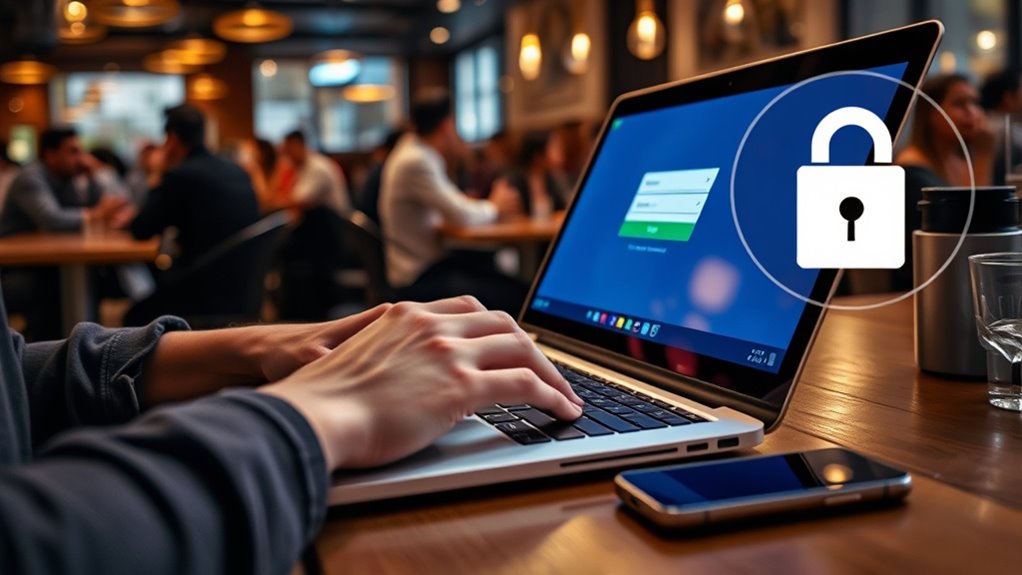
Public Wi-Fi networks can be risky, so always use a VPN to encrypt your connection and protect your data. Avoid performing sensitive transactions like banking or shopping on these networks, as they’re more vulnerable to hackers. Enable network alerts to stay informed about any suspicious activity while you’re connected. Being aware of trailer music techniques can also help you recognize potential security threats in digital content.
Use VPNs Always
While public Wi-Fi networks offer convenient access, they often lack strong security measures, making your data vulnerable to interception. Using a VPN consistently enhances your online safety by encrypting your internet traffic. The VPN benefits include protecting sensitive information, hiding your IP address, and preventing hackers from spying on your activity. Choose reputable VPN providers to ensure reliable security. Additionally, understanding high refresh rates and low input lag can help you stay protected during activities like gaming or streaming.
Avoid Sensitive Transactions
Have you ever considered the risks of conducting sensitive transactions over public Wi-Fi? Public networks are often insecure, making it easier for hackers to intercept your data. Avoid performing activities that require secure payment or transmitting confidential data when connected to these networks. Public Wi-Fi doesn’t provide the encryption needed to protect your information, increasing the risk of identity theft or financial loss. If you must access sensitive accounts, use a trusted VPN, but even then, it’s best to delay these transactions until you’re on a secure, private connection. Staying cautious helps safeguard your personal and financial information from cybercriminals lurking on unsecured networks. Remember, your personality traits can influence how cautious or risky you are online, so understanding them can help you make safer choices. Your sensitive data deserves extra protection—so avoid risky transactions on public Wi-Fi whenever possible.
Enable Network Alerts
To stay vigilant when using public Wi-Fi, enable network alerts on your device. These alerts notify you of unusual network activity, helping you detect potential threats early. By activating anomaly detection, you can identify suspicious behavior that may indicate hacking attempts or data breaches. Implementing AI-powered security tools can further enhance your ability to recognize and respond to cyber threats in real-time.
Consider these tips:
- Receive instant alerts for unexpected network connections
- Monitor real-time network activity for anomalies
- Detect unfamiliar devices connecting to the network
- Get notified if your device joins unrecognized networks
- Stay informed about possible security breaches
Enabling network alerts empowers you to respond quickly to potential risks, protecting your personal information. Staying aware of network activity helps prevent cyber threats, especially on public Wi-Fi, where security is often compromised.
Install Reliable Security Software

How do you guarantee your online activities stay safe from threats? The key is installing reliable security software. Start with reputable antivirus software that scans your files and detects malware before it causes harm. Make sure it updates automatically to stay ahead of new threats. Additionally, enable firewall protection to block unauthorized access to your network. A good firewall acts as a barrier between your device and potentially malicious traffic, preventing hackers from infiltrating your system. Don’t settle for free or outdated software; invest in a trusted security suite that offers all-encompassing protection. Regularly run scans and keep your software current. Incorporating dedicated security tools can further enhance your defenses, providing specialized protection against emerging cyber threats. This proactive approach helps safeguard your personal information and keeps your browsing experience safe and secure.
Avoid Clicking on Suspicious Links or Attachments
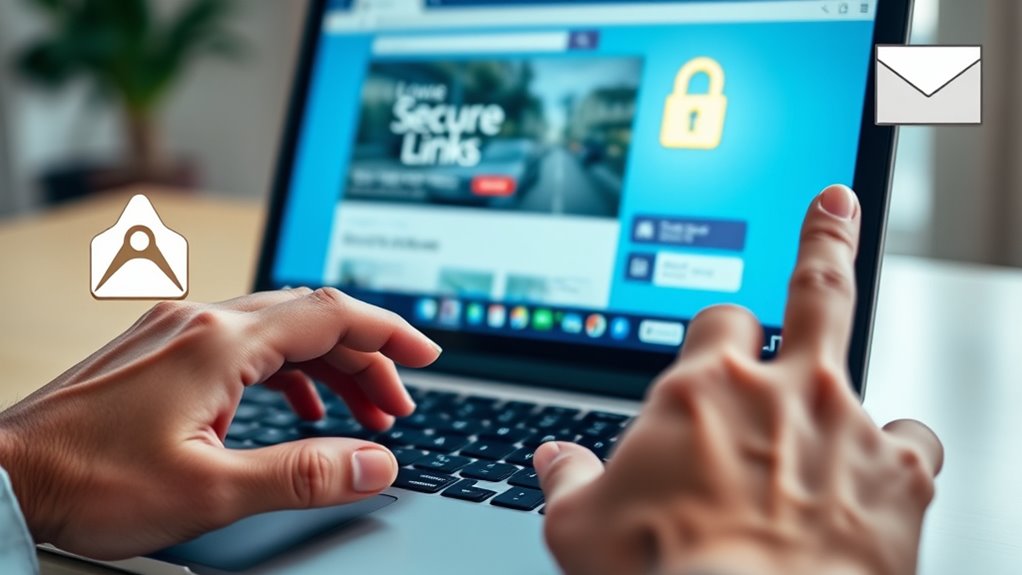
Even with strong security software in place, you can still be vulnerable if you click on suspicious links or open unfamiliar attachments. Phishing scams often use malicious emails to trick you into revealing personal information or installing malware. Stay alert and cautious to avoid falling victim. Being aware of common attack methods can help you recognize and avoid threats more effectively.
Be mindful of these tips:
- Hover over links to verify their destination before clicking
- Don’t open attachments from unknown senders
- Look for signs of phishing scams, like misspelled words or urgent requests
- Avoid clicking on links in unsolicited emails
- Delete suspicious messages immediately
Use Secure Websites (HTTPS) for Transactions
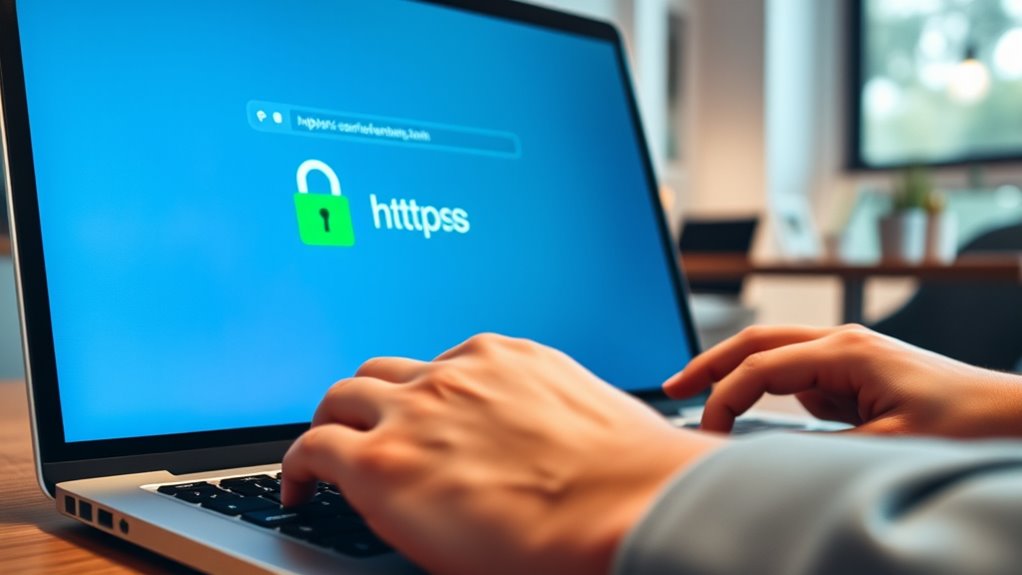
Using secure websites with HTTPS is essential whenever you conduct online transactions. HTTPS guarantees your data is encrypted with SSL certificates, preventing hackers from intercepting sensitive information. Always verify the website has a secure checkout process before entering your payment details. Look for a padlock icon in the address bar, indicating a secure connection. To highlight this, see the table below:
| Indicator | Meaning |
|---|---|
| Padlock icon | Website uses HTTPS |
| HTTPS URL | Secure connection established |
Regularly Clear Your Browser Data

Regularly clearing your browser data is a simple but effective way to protect your online privacy and enhance security. Over time, your browser cache and cookies accumulate, which can expose sensitive information or slow down your browsing experience. By managing cookies and clearing your cache regularly, you prevent unauthorized access to your data and reduce tracking.
Consider these tips:
- Clear your browser cache frequently to free up space and improve speed
- Manage cookies to control what websites store about you
- Remove stored passwords and autofill data for added security
- Use privacy settings to limit cookie tracking
- Use browser extensions for automatic data clearing
Consistent cookies management and cache clearing help keep your browsing safer and more private.
Frequently Asked Questions
How Can I Recognize a Secure Website Beyond HTTPS?
When you want to recognize a secure website beyond just seeing HTTPS, look for website certificates issued by trusted authorities, which verify the site’s authenticity. Also, check for a visible lock icon in your browser’s address bar, indicating a secure connection. These signs show that the site encrypts your data and is more trustworthy. Don’t ignore warnings or suspicious signs; always verify the certificate details if unsure about a website’s security.
What Are Common Signs of a Compromised Account?
Oh, your account’s throwing a tantrum? Watch for signs like unexpected emails, especially phishing ones, or strange login alerts. If you see unauthorized transactions or weird activity, it’s a red flag. Sometimes, hackers send phishing emails to sneak in, so stay cautious. Your account might be compromised if you notice these signs—act fast, change passwords, and verify your account activity to stay safe.
How Often Should I Change My Passwords?
You should update your passwords regularly to maintain security. Aim for a password update every few months, especially if you suspect any compromise. Make sure your passwords have high complexity, combining letters, numbers, and symbols for stronger protection. Avoid reusing passwords across sites. Regularly changing your passwords and maintaining high password complexity helps prevent unauthorized access, keeping your accounts safer from potential threats.
Are VPNS Effective for Safe Browsing?
Yes, VPNs are effective for safe browsing because they use VPN encryption to protect your data from prying eyes. They also allow you to choose VPN server locations, which can help you access content securely and privately. When selecting a VPN, guarantee it offers strong encryption and a variety of server locations to maximize your safety online. This way, you keep your browsing habits private and reduce risks of cyber threats.
What Should I Do if I Suspect Malware on My Device?
Imagine your device under attack, sensitive information at risk. If you suspect malware, act quickly. Run a trusted antivirus software to scan and remove threats. Disconnect from the internet to prevent further damage. Consider updating your system and software for better protection. If malware persists, seek professional malware removal services. Staying vigilant and proactive keeps your devices safe and your data secure amidst the digital threats you face daily.
Conclusion
By following these simple steps, you create a shield around your online world. Imagine your browser as a fortress, each tip like a sturdy brick strengthening your defenses. When you stay vigilant—updating software, choosing strong passwords, and avoiding risky networks—you keep cyber threats at bay. Feel confident as you surf smoothly, knowing your digital space is secure. With mindful habits, your web experience becomes a safe, flowing stream—peaceful, protected, and ready for exploration.





